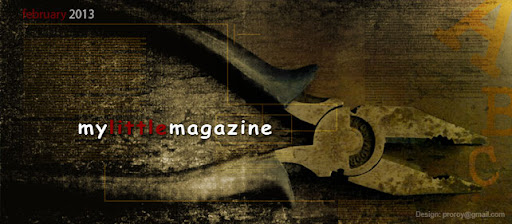By Ananya Mukherjee
Singapore
In
the beginning, there was just nothing; only a vast expanse of deep aquamarine,
ripples and floating shadows of abundant liquid exuberance. The ocean floor
danced in a magnetic slow motion, caressing the tip of pale pink coral beds,
gurgling into the purple reefs and gushing out through the secret crags,
sweeping a school of bright orange goldfish.
Something moved with them forming a shape, edged by a strange aura;
floating, gargling, rippling in the fantasy, and slowly took a human form. A soft, pink, delicate human body floated
up....and called out...Mama.
Siya
woke up startled by that call and instinctively touched the bulge of her
abdomen. Almost at the end of her third trimester, with only a few days away
from the expected date of delivery, her body felt very heavy. She stroked her palm
gently across the swollen bump. It was a baby boy, they had confirmed only a
few weeks back. The very thought that he was growing inside her with each
passing day, breathing what she inhaled, hearing what she heard, and perhaps
feeling what she felt filled her with a strange mix of contentment and longing
for his presence. She pressed her hand tenderly down her abdomen. For a moment,
she did not feel any movement. Then, as if anticipating the yearnings of her
desperate search, he obliged her with a kick. Ouch, it hurt, yet left her with
an overpowering affection.
It
wasn’t morning yet so she had some more time to catch up on sleep before going
back to the buzz of the newsroom. Siya’s maternity leave had not started yet. As
a single mother, she knew she would need all the time in the world once the
baby came. She was even considering a sabbatical. Her own parents lived thousand
miles away and were aging. It wasn’t possible for them to offer any childcare
services. Also, they were not too pleased with Siya’s determination to go for
artificial insemination and bear a child alone without a male partner. She was
their only child, young, attractive, glamorous and successful. The very idea of
single parenthood sounded bizarre to them.
“You
are only 35. Why don’t you marry a nice man and have your own child instead of
carrying someone else’s baby in your womb?” Her mother had argued.
It
took Siya a while to convince them that it was not “someone else’s baby”. It
was hers, an extension of her being, nurtured inside her with her own flesh and
blood. But her parents were still unsure. Wasn’t adoption a better idea if she
wanted to cherish the bliss of motherhood, they questioned. No, she wanted her
own child, she had put her foot down. And without a man in her life! After a
few unpleasant relationships, especially her last complicated commitment with a
senior colleague, she had decided not to be in a long-term commitment with any
man. The question of marrying a non-existent “nice man” therefore did not
arise. Yet, she wanted to be a mother,
desperately wanted to conceive and raise her own child for a long time.
Naturally,
when a gynaecologist friend convinced her a year back that she needed no man to
fulfil her dreams, and artificial insemination was not rocket science, it took
her little time to decide. Despite no
support from her family, Siya went ahead with the idea. In due time, a sperm
bank was contacted, and on a scheduled date, she was inseminated by a donor who
chose to keep his identity under wraps. Siya was happy with the arrangement as
she had neither the interest nor the will to know the biological father of her
child. It would only invite more complications, she rationalised.
Another
sharp kick broke through Siya’s reflective mood. She pulled a pillow and sat
upright, as her back was beginning to hurt now.
She could feel a numb pain in the abdomen and a sudden pressure growing in
the pelvis. Then a wave like motion resembling a strong menstrual cramp seized
her body. It lasted a few seconds and then came back again, till it almost became
a norm. Then gradually the length of the contractions increased and the gap
between their intervals lessened. Siya realised the time had come. Between
contractions, she started to focus on the breathing exercise she was taught at
a pre-natal workshop she had attended and called for an ambulance.
The
next few hours went in a whirlwind. Before she knew it, the amniotic membrane
ruptured and Siya went into labour. Whilst the doctors waited a few hours for
the dilation to reach the right measure, amidst excruciating pain, Siya who was
lying alone in a dull labour room saw recurrent visions of her dream in aqua
blue. It was the same swirling ocean, masquerading in a riot of floating
colours—pink, purple, crimson and Prussian blue. She swam with the fluid’s
magnetic motion, falling into its unfamiliar charm until it drew her to a cul-de-sac, She felt her own body rise
and swell above the water and then sensed a free falling like never before. It
was close to midnight when the uncontrollable agonising pain reached its climax
and Siya heard the baby cry out.
Siya
was still gasping for breath, when she caught the intrigued expression on her
doctor’s face. Something was not normal. It was not the post childbirth scene
she had rehearsed in her mind where the doctor and nurses would be
congratulating her for giving birth to a healthy child. There was darkness on
the faces of the medical staff surrounding her. She tried to read the
expression. It was one of bewilderment
and nervousness. The nurses had the same look in their eyes and the uncertainty
of their appearance frightened Siya.
Assimilating some energy, she asked, “Is everything alright?”
“Ah..well.....yes,
Siya. There is no sign of distress. He’s perfectly fine, I think, but...” her
doctor replied, handing over a little bundle smeared with blood and mucus.
Her
mouth fell as she gathered him in her frail arms. His tiny gentle angelic face
was well defined with a pair of large eyes and a small pointed nose. He looked
healthy, well formed and his head was full of dark curls. Only his skin had the colour of a bruised
plum. In fact, the prominent bluish tint was so dark that it looked almost
purple.
Coming
to terms with the unanswered mystery of the unpredictable blow that changed the
complete dimension of her dreams was difficult, actually much more difficult than
Siya had ever imagined. She tried to find answers to the many questions that
tormented her mind and agonised her soul. Why did he have to be this way? What
was wrong with him? Was his condition life threatening? Was it genetic? All she
had wanted was a normal healthy baby. Why did God have to do this with her?
Unable
to find an explanation and fearing that she might go into a post-labour trauma
any moment, the doctor had taken away the baby boy immediately and raced him by
ambulance from the maternity ward in the hospital to a bigger research and
medical laboratory in another part of the city.
A team of doctors had begun to investigate the case. In the beginning
they assumed it was a case of abnormal haemoglobin or an enzyme deficiency but
the results were negative. Two days of test results produced no explanation why
a seven pound healthy baby boy who showed no signs of foetal distress exhibited
such an unusual disorder.
Though unable to pinpoint to
a particular reason for his unnatural blueness, the team had ruled out
possibilities of a heart disease or any blood or lung disorder. What no one
ever found out was a medical condition called hereditary methemoglobinemia
where the absence of an enzyme called diaphorase from the red blood cells could
lead to such a blueness of the skin. Due to the
enzyme deficiency, the blood of these victims has reduced oxygen-carrying
capacity. Instead of being the usual bright red, arterial blood is chocolate
brown and gives the skin a bluish tint. Hereditary met-H, as it is called, is
caused by a recessive gene. In other
words, to get the disorder, a person would have to inherit two genes for it,
one from each parent. Somebody with only one gene would not have the condition
but could pass the gene to a child. Siya must have carried such a strain
without her knowledge and what seemed like a cruel joke played by destiny, the
unidentified sperm donor had the same. The result, thus, was a blue baby.
“His
blood is just a little closer to the skin,” a colleague had sarcastically
remarked while paying a visit to the new born in the hospital. The thought of
the social stigma that her son may have to grow up with in a world that was
accustomed to see only men who were either white, yellow, brown or black was intimidating
Siya. Where would her blue child fit in?
Ever
since she came home from the hospital she had tried to retrace the sperm donor
in an attempt to know if there was any genetic disorder in the donor that might
have led to this peculiar condition. The sperm bank having pledged
confidentiality to the donor, revealed no further information than that he was
apparently a healthy man with no such evident disorders. She consulted all the
doctors, researchers, social anthropologists she knew but found no satisfactory
answer. While some literature directed her to a certain blue family called
Fugates in distant Troublesome Creek, Kentucky, others misled her to the Tuareg
nomads of Sahara desert in Africa. The skin of the desert herders are known to
turn blue from the dye they use in their clothing. But how the Fugates or the
Tuareg tribesmen could correlate to her child was still a mystery. Whilst the
malady of the soul ripped Siya apart, the little one was, of course, oblivious
to the uniqueness of his appearance.
She
looked at him sleeping peacefully with his fingers curled on the baby cot she
had specially designed for him ever since she knew he was coming. The moist
afternoon sun filtered through the blinds and fell on his forehead. It shone
like specks of gold dust over his little frame. The purplish tinge had begun to
fade into a more uniform hue of blue after the first few weeks. In some places,
the skin was so light that Siya felt she could almost see through it like
alabaster. With the tiny sunlit dots shining on him, he looked as if he were gilded
in soft gold. The black curls fell on his rounded little forehead, accentuating
the blueness of his porcelain skin. She stared at his contented innocent face
and thought she saw him smiling in his sleep. Babies often converse with gods
when they sleep, they said.
Just then someone rang the door bell. It was
Maya, Siya’s domestic help for many years.
“Why
are you so late? It’s already afternoon. What took you so long?”
“Arre
Didi, there is so much traffic these days. You know I come from so far away.
And then my husband also came back last night, “she added with a shy smile.
“Oh,
that joker of yours! What does he want now?”
Maya’s
husband worked as a part-time comic relief in low grade circus companies that
travelled in small towns across the country in weird looking buses with strange
and ugly faces painted on them. Ram Prasad was an incorrigible bloke who came
back jobless after every few months to torment Maya and live on her savings.
Once he had finished with what Maya had worked hard to save, he came home drunk
and often ended up being abusive. This was a routine affair that Siya had
observed over the years. She had told Maya several times to get rid of him but
Maya had protested with a logic Siya could not refute. “Didi, in our society,
one single woman cannot survive alone. Men are like vultures. They will tear me
and my children to pieces if I leave him. In your educated and rich society,
you can do what you want but my world is different.”
“Hmm.
So what does he want now?”
“Nothing,
Didi. You know him. He has been kicked out again for stealing money from his
boss. Now he has nowhere to go. I can’t let him die on the streets,” she said
picking up the used feeding bottles.
“How’s
Munna? Is he sleeping?”
“Who?”
Siya retorted with her eyebrows raised.
“Munna...baby...your
baby! You haven’t named the poor fellow anything as yet, but I call him Munna
and he responds, you know.”
“Please,
babies at this age don’t respond to anyone or anything. And he’s definitely not
Munna. I will decide on a name soon and let you know.” The thought of labelling
her precious son, the dream of her life with the commonest Bollywood stamp
“Munna” irritated her. But then, Maya was right. After she got the hospital
registration certificate that said “baby boy” Siya had been so caught fighting
her own distress and disappointment that she had not christened him with any of
the names she had on mind. As she recapitulated, Siya felt guilty of her
negligence now.
She
dialled her mother’s number and told her she was organising a naming ceremony
for her son and wanted her to give him her blessings. Much as her parents were
against the concept of artificial insemination, they were horrified by the
reality that their grandchild displayed such an abnormality. Their rejection wore
no mask, and her mother refused to participate in the official and religious
christening of what she now called the devil’s creation. Siya hung up crying,
frustrated that the nearest of her kin had so ruthlessly ousted her from their
lives.
“Auntie,
can I come in?” Neha, the neighbour’s chirpy four-year-old daughter was peeping
through the door that Maya had forgotten to lock.
“Yes,
please,” Siya said as she tried to hide the moistness in her eyes. In a frilly
pink and white dress, Neha looked like an ice-creme candy doll straight from
the shelves of a toy store.
“Can
I see the baby? What is he doing? Won’t he play with me?”
“Yes,
of course, Neha. He’s sleeping now, but you can see him. Come with me.”
Siya
held her tiny hand in her own and led her to where he was still sleeping with a
smile on his face.
“Why
is he so small? How will he play with me if he’s so small?”
“He’s
only a few weeks old, Neha. Let him grow up a bit, then he will play with you,”
Siya broke into an affectionate smile.
“But
why have you painted him blue, Auntie?” She peeped further into the cot.
Siya’s
jaws tightened. “I didn’t paint him Neha. He was born that way.”
“Why
was he born blue? Is he like Shrek?”
Neha’s
curiosity was beginning to irritate Siya now. “Shrek was not blue. He was
green. And Shrek was an ogre. My baby is a human being like you and me. Now if
you have seen the baby, you can go home or play with your friends.” The poor child was taken aback by the
harshness of Siya’s tone and ran away at once.
She regretted being rude to a little girl almost immediately but her
patience with speculations about her son was weaning.
Neha
had left the door slamming aloud startling the baby in his sleep. He curled his
lips and began to cry. Maya rushed to him picking him up in her arms, and
started pacifying him as Siya watched on looking defeated.
“Didi,
he’s hungry. Just hold him and I’ll get the little one some milk,” Maya left
him wailing in her arms.
“Siya,
are you home?” Her colleague Jenny was at the door.
“Oh
yes, Jenny. What a lovely surprise! Please come in.”
Jenny
was a young reporter who had joined the newsroom a few years back as an intern
under Siya. Ambitious and reckless, Jenny could go to any lengths to get a
story. Though Siya never quite liked her personally, she was an asset to the
team. Jenny’s untimely visit surprised Siya. What was further suspicious was
the way Jenny was staring at her son. It made Siya uncomfortable.
“How
have you been Jenny?”
“I
am good, thanks Siya. How are you doing? Must be difficult managing a baby
alone!”
“Oh
we are doing perfect together, aren’t we love?” Siya said putting the nipple of
the milk bottle in his hungry mouth. Maya stood behind the two looking angrily
at Jenny.
“Didi...please
don’t feed Munna in front of others. People have evil eyes, you know. Let me
take him inside while you talk to her,” she whispered hoarsely.
“Hmm.
Take him inside, Maya. Once he finishes his drinking, give him a lukewarm water
wash, powder him well and change his clothes. And no kohl please! I don’t want
my son to look like the babies down the streets.”
Siya
turned to Jenny and asked, “What brings you here? Are you not working today?”
Jenny
looked around hesitantly. “Well, Siya, there is a buzz in the newsroom about
the birth of your son. You know we understand there has been a mishap, but we all
want to know more. I just wanted to ask you some questions.”
“What?
Are you so short of ideas that you need to make a story from my own personal
life?” Siya couldn’t believe her own colleagues were trying to commercialise
her despair. Jenny’s insolence seemed unpardonable.
“No,
no, don’t get me wrong. There have been speculations of all kinds. Some say,
the baby has a lung problem. He won’t live long. Others are talking about an
abnormality in conception, or maybe that he has other features that can reveal
he’s not really human like us....maybe he is from another world, another
planet, an ET of sort?”
“STOP!!!
What do you mean? My son is a Martian? He has horns? Did you see any? How dare
you? Is this a Hollywood 3D flick? Have you gone out of your mind? ” Siya’s
voice and temper were rising beyond the civic norms.
“You
are getting me wrong. There’s a great story here,” Jenny tried to convince.
“Story?
Damn it, it’s my life. Get the hell out of here before I call the security and
throw you out,” Siya was standing now and shaking with rage.
After
Jenny left in a rush, Siya locked the main door, bolting it from inside,
flopped down on the living room couch and closed her eyes. What did she do to deserve this? All she had
wanted was a child of her own!
“Didi,
my husband has come to take me home today. Can I go a little early? I have
finished all the chores and even Munna is happy now after drinking his milk. He
will fall asleep in a while. Then you can also take some rest. The ayah who
comes for the night shift will be here in two hours. You can manage till then,
can’t you?” Maya was standing at the foot of the couch tidying up the pleats of
her saree. Siya did not have the heart to say no to her.
“Ok.
Call him inside. Put baby to sleep first and then go. And don’t be late
tomorrow morning,” she said in a tired voice.
The
noise of an object falling shook Siya. “What happened Maya?” She shrieked and
what she saw left her jaws open. Like a woman who had been taken over by some
uncanny power, Maya rushed out of the kitchen chasing Ram Prasad out of the
door hurling abuses at him. In one hand Maya was holding Siya’s son close to
her chest. In the other, she had a long kitchen knife pointed at her husband.
“What
is this? What is going on, Maya?” Siya panicked.
“The
rascal! The devils will feed on your rotten corpse!” She shouted as Ram Prasad
ran out of the main door. “He came to
tell me to take Munna away and sell him off to those bastards in the circus.
Says they will pay good money for a blue baby. I told him to get out of my
sight if he did not want his throat slit. The scoundrel that he is, Didi! I
never thought he could come down to this level,” she was panting furiously.
“Oh
my God, what are you saying, Maya? He came here to kidnap my child?” Siya’s
head was reeling. She grabbed her wailing son who was now wide awake from the
commotion and violence around and broke down.
“Didi,
don’t fear the evil. Don’t give up hope. It’s not your fault. Munna is only
little different but he’s still your own. God only made him this way. I am not
educated like you. I am only a simple God fearing woman. Didi, let’s take Munna
to the temple and get the Lord’s blessings. He will protect your son,” Maya
tried to offer all the consolation she could.
Siya’s
maternal instincts were stronger than her indomitable modern independent
spirit. As a self made successful professional, she never needed to bow before
anyone, and religion was the last thing on her priority list. Yet, when it came
to the intimidating fear for her son’s life and security, she gave in to an
ordinary illiterate woman’s advice. When Maya took them to the nearest temple
in the neighbourhood that very night to plead the deity to save the child from
evil eyes, Siya did not question her intent or actions. She mutely followed the
rituals that the priest suggested, exposing her son to the world for the first
time since his unusual birth. Standing next to her as she offered her prayers
was a dreamy eyed little boy with what looked like a down syndrome. He kept
staring at her son with a strange look in his eyes, as if he saw what others
could not, as if he saw beneath his skin. Siya was beginning to get rigid,
fearing more assaults for the little one, when the boy’s mother pulled him away
and apologised to Siya.
“Sorry,
he doesn’t mean any harm. My son is not very well.” Siya thought she saw tears
in her eyes as she said the last words. The boy refused to budge and when his
mother insisted, he cried out “kaaaan..ha....”pointing a finger at Siya’s son. Siya
felt a lump in her throat as he repeated,”Kaaan...ha... kaaanha.... kaanha”
Why
didn’t she think of this before? Kneeling at the altar of the Supreme where all
powers merged and disseminated as one, with tears rolling down her cheeks, Siya
picked up her son, the dream of her life, the extension of her being, kissed
him on the forehead for the first time and softly whispered, “Kanha...the
avatar of the strongest and the most positive force in the world, the emblem of
truth, love and beauty –the blue God, yes, that’s what you will be called
henceforth. Welcome to the world!”














